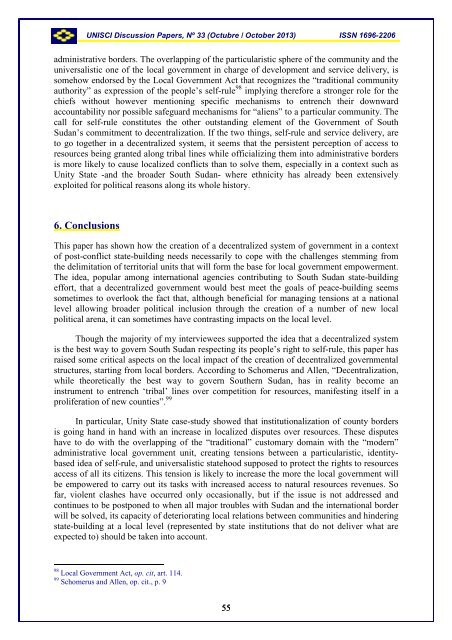UNISCI - Universidad Complutense de Madrid
UNISCI - Universidad Complutense de Madrid
UNISCI - Universidad Complutense de Madrid
Create successful ePaper yourself
Turn your PDF publications into a flip-book with our unique Google optimized e-Paper software.
<strong>UNISCI</strong> Discussion Papers, Nº 33 (Octubre / October 2013) ISSN 1696-2206administrative bor<strong>de</strong>rs. The overlapping of the particularistic sphere of the community and theuniversalistic one of the local government in charge of <strong>de</strong>velopment and service <strong>de</strong>livery, issomehow endorsed by the Local Government Act that recognizes the “traditional communityauthority” as expression of the people’s self-rule 98 implying therefore a stronger role for thechiefs without however mentioning specific mechanisms to entrench their downwardaccountability nor possible safeguard mechanisms for “aliens” to a particular community. Thecall for self-rule constitutes the other outstanding element of the Government of SouthSudan’s commitment to <strong>de</strong>centralization. If the two things, self-rule and service <strong>de</strong>livery, areto go together in a <strong>de</strong>centralized system, it seems that the persistent perception of access toresources being granted along tribal lines while officializing them into administrative bor<strong>de</strong>rsis more likely to cause localized conflicts than to solve them, especially in a context such asUnity State -and the broa<strong>de</strong>r South Sudan- where ethnicity has already been extensivelyexploited for political reasons along its whole history.6. ConclusionsThis paper has shown how the creation of a <strong>de</strong>centralized system of government in a contextof post-conflict state-building needs necessarily to cope with the challenges stemming fromthe <strong>de</strong>limitation of territorial units that will form the base for local government empowerment.The i<strong>de</strong>a, popular among international agencies contributing to South Sudan state-buildingeffort, that a <strong>de</strong>centralized government would best meet the goals of peace-building seemssometimes to overlook the fact that, although beneficial for managing tensions at a nationallevel allowing broa<strong>de</strong>r political inclusion through the creation of a number of new localpolitical arena, it can sometimes have contrasting impacts on the local level.Though the majority of my interviewees supported the i<strong>de</strong>a that a <strong>de</strong>centralized systemis the best way to govern South Sudan respecting its people’s right to self-rule, this paper hasraised some critical aspects on the local impact of the creation of <strong>de</strong>centralized governmentalstructures, starting from local bor<strong>de</strong>rs. According to Schomerus and Allen, “Decentralization,while theoretically the best way to govern Southern Sudan, has in reality become aninstrument to entrench ‘tribal’ lines over competition for resources, manifesting itself in aproliferation of new counties”. 99In particular, Unity State case-study showed that institutionalization of county bor<strong>de</strong>rsis going hand in hand with an increase in localized disputes over resources. These disputeshave to do with the overlapping of the “traditional” customary domain with the “mo<strong>de</strong>rn”administrative local government unit, creating tensions between a particularistic, i<strong>de</strong>ntitybasedi<strong>de</strong>a of self-rule, and universalistic statehood supposed to protect the rights to resourcesaccess of all its citizens. This tension is likely to increase the more the local government willbe empowered to carry out its tasks with increased access to natural resources revenues. Sofar, violent clashes have occurred only occasionally, but if the issue is not addressed andcontinues to be postponed to when all major troubles with Sudan and the international bor<strong>de</strong>rwill be solved, its capacity of <strong>de</strong>teriorating local relations between communities and hin<strong>de</strong>ringstate-building at a local level (represented by state institutions that do not <strong>de</strong>liver what areexpected to) should be taken into account.98 Local Government Act, op. cit, art. 114.99 Schomerus and Allen, op. cit., p. 955
















